#would've been so much more meaningful to see them grow like that and actually communicate for real.
Explore tagged Tumblr posts
Text
Barbie Review [SPOILERS]
Hi everyone! So my mum and I FINALLY got around to seeing Barbie (I swear, we would've seen it much sooner, had it not been for RL getting in the way!), and we both really enjoyed it. That doesn't mean we didn't have thoughts about it -- a LOT of thoughts about it -- so I thought I'd go ahead and write them all down in a proper review!
For those of you who want a short, spoiler-free analysis, I'd say the movie was a very entertaining and surprisingly thoughtful story that had a lot to say about gender politics, "girl power," and our patriarchal society, and although it sometimes was a bit too simplistic in how it approached those topics, that doesn't mean it wasn't still timely or meaningful.
For those of you who want me to dive in more deeply...here's a cut!
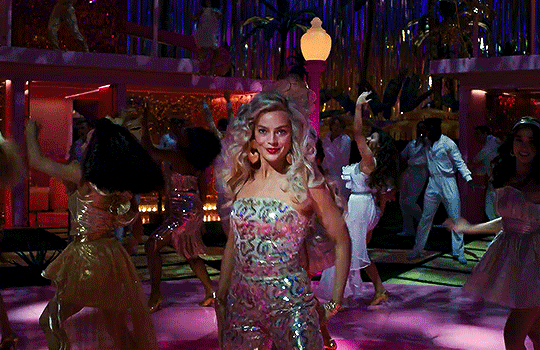
The Good!
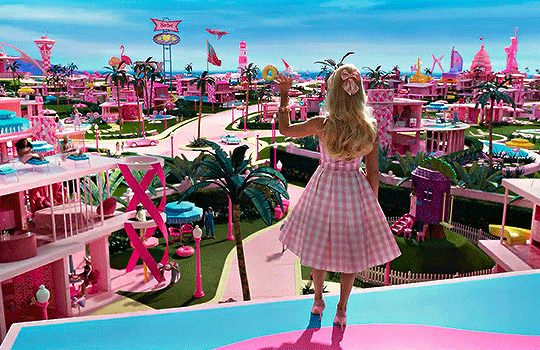
+Speaking as someone who was never a Barbie girl or even a "doll" girl growing up (my favorite toys were figurine sets of my favorite animated movie characters), I can still testify that Barbie Land's whole aesthetic perfectly captured a "little girl" vibe. It was bright, plastic, nonthreatening, and very what-you-see-is-what-you-get. Up to a certain point, it has a very "Stepford" quality where everything is just like the day before and nobody is ever unhappy or angry, but it's still a charming and likable place. You can float off of buildings and down to the street below; you can go down slides instead of stairs; you can drive in a car that becomes a ship that becomes a rocket and then an RV. Everything is about friendship, solving problems that seem huge and dramatic with incredibly simple solutions, and finding joy in cute, everyday things. It's a bit shallow and vapid, yes, but it's never oppressive or sinister, and the inclusiveness of the many different kinds of Barbies and Kens -- not just racially, but in personalities, body types and abilities -- immediately communicates that anyone could belong in this world. (A theme that's explicitly stated later and reinforced when the discontinued Barbies/Kens and "Weird Barbie" are brought more into the fold.) Therefore you understand both why our main character wants things to stay as they are and feel investment in that world being saved, even despite its flaws. It also made for a perfect contrast between Barbie Land and the Real World -- when the two aesthetics collided, like when Barbie and Ken first arrive in Los Angeles, it was appropriately jarring.
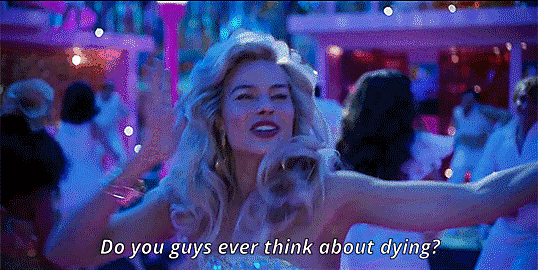
+Our main Barbie herself!! Talk about a relatable character! The juxtaposition of her desire for happiness and "normalcy" contrasted with her anxious and depressive tendencies really makes for a funny and engaging protagonist. Her character arc was incredibly well-done, and I love that she came around to embracing humanity largely because of how much more...well, for lack of a better term, "real" things were in the Real World. The scene with Barbie in the park enjoying listening to the birds in the trees, laughing herself upon seeing two strangers talking and laughing together, and complimenting the old woman on her beauty was absolutely perfect. From what I've heard, director Greta Gerwig was pressured to remove that scene at one point, only for Greta to viciously refuse, claiming that if that scene was cut, she wouldn't "know what the movie was about" -- and you know, I can totally see why. It really pinpoints Barbie starting to understand that as shallow and pretty as her fantasy world is, the things that inspired it are even more beautiful, because they're not just plastic and manufactured. Instead they're natural, imperfect, warm, and alive.
+Can I also just add a bullet point celebrating that Barbie is not interested in Ken romantically and the movie makes that very clear not just in subtext, but in actual written text? I liked the struggle Ken had to deal with having feelings that weren't reciprocated, as well as Barbie just never having to engage in a romantic relationship, even after deciding to become human and theoretically grow up and grow old. She just never gives a shit about Ken or other guys or even romance overall at any point, and for someone who identifies with the "A" side of the LGBT+ community, that was so bloody refreshing. (Seriously, that whole scene where Ken tried to kiss Barbie good night and Barbie was just quietly like "nope"? I felt that SO HARD.) It's such a common thought process that media that focuses on friendships exclusively are inherently more child-like, especially ones with female protagonists, and it's always nice to see a film clearly made for adults with a female protagonist not feature the convention of our female and male leads being in a romantic relationship. It's especially nice considering that Ken's whole identity was wrapped up in "being Barbie's boyfriend," and shoehorning in a romance between them would've completely contradicted his whole arc of him learning who he is as an individual.
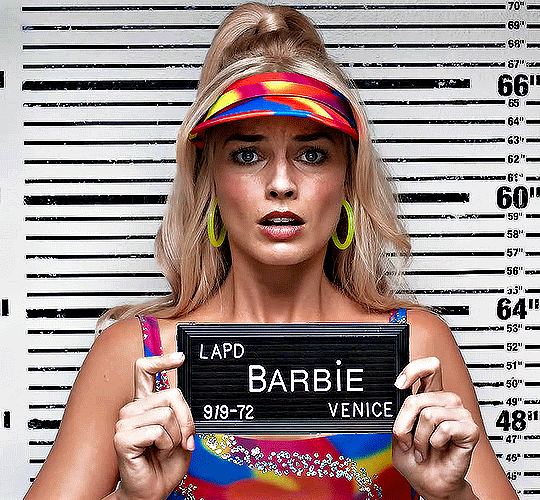
+There was some really, really good humor in this movie, especially once Barbie and Ken got to the Real World. My mum and I laughed a lot while watching this, not just quiet chuckles, but full belly laughs! A lot of jokes I saw in trailers and in fan art and gif sets online ahead of time, like Barbie and Ken getting arrested, but even the ones I saw coming were still hilarious in context. And the ones I didn't, I laughed SO hard at. The Depression Barbie commercial made me laugh so unbelievably hard. (Yes, I could see binge-watching the BBC Pride and Prejudice for the seventh time until I fall asleep on one of my bad days. Don't judge me.)
+There was also some excellent dance choreography in this too -- I can only imagine how fun this movie was to shoot!
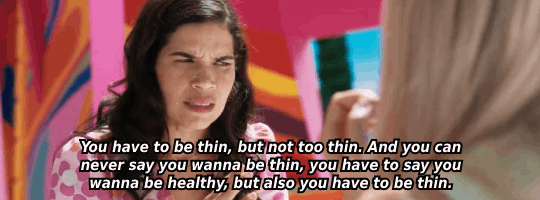
+Good plot twist with it being mom Gloria that imagined up our Barbie, rather than her daughter. I saw it coming as soon as we saw Gloria at work with those costume concepts, but still, very good plot turn, and I like how her and her daughter's contrasting views of Barbie bumped up against each other while they helped Barbie escape Mattel.
+Oh yeah, and Gloria? GO OFF, GIRLFRIEND!! That whole monologue she did at Weird Barbie's house was so well-written and spot-on it hurt. Next time I encounter anyone who thinks men and women are treated equally, I think I'll just quote that scene.
+Speaking of Mattel, YES on having the board members all be men, and almost all white men at that. And YES on the movie for calling out both the tragic reality and absurdity of that.
+Adding onto what I touched on above, as much as I do have a few somewhat-nitpicky problems with how this film depicted "the patriarchy," it did overall really beautifully showcase the toxicity of it. In a day and age where women of all kinds are being targeted -- whether by restricting abortion rights and access to birth control, challenging women on their femininity in sports or even public bathrooms out of rampant transphobia, or otherwise -- this movie couldn't have come at a better time, and I love that a movie that so clearly embraced unabashed femininity is being celebrated so much.
The Not-So-Good...
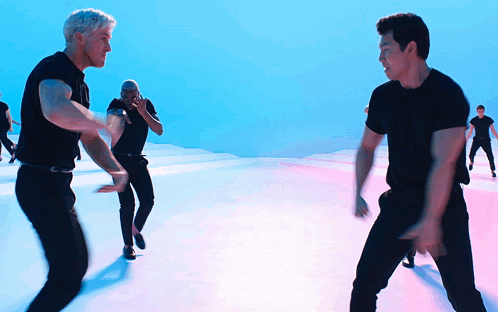
+One thing I really didn't care for in this film was its use of music. I thought the shift from the music being largely non-diegetic (namely, something played as accompaniment for montages) to a staged, musical-style battle scene was incredibly jarring. As much as the campiness of the sequence was a little fun (the Grease references in particular made me grin), it did go on a little too long, and again, it felt like a sudden shift. I would've much preferred it if the film had either gone full-out in making itself a musical or just stuck to using music as a side element, rather than a focal point.
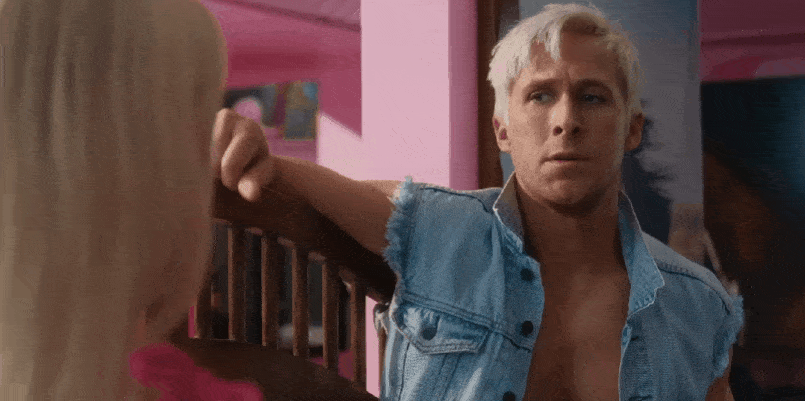
+As much as I understand the film was trying to make a point that superiority for any gender is inherently harmful to everyone, by having the Kens being quietly subjugated in the matriarchal Barbie Land the way women are in the Real World, I personally found that concept a little unpleasant in practice, because it plays into the idea that any victimized group would -- upon being treated with respect -- immediately turn around and want to subjugate others. It's not that I can't understand how Ken could get suckered into such toxicity, or even feel empowered, being in a world where people like him have power and autonomy...but it just made me really sad seeing him reacting so positively to being respected and represented, only to become an antagonist who turned all of his female friends in Barbie Land into mindless arm candy. Yes, incels exist and innocent men get suckered into that all the time, especially men who, like Ken, are desperate for romantic approval from a woman who is not interested in him...but considering that the film makes it clear that Kens -- unlike Real World men -- are considered as an "addendum" in Barbie Land and are second class in that society, the allegory feels a bit muddled. This isn't an issue of men growing up in a world where they're told to expect certain things -- namely, getting a great job without much effort, earning lots of money, "being the man of the house," "getting the girl," that sort of garbage -- and yet when they can't achieve all those things, they take it out on women because they can. It's become a story of a marginalized group turning around and marginalizing others...and honestly, I think that's what a lot of racists, sexists, whatever else fear above all else and why they're so desperate to keep their claws so tightly around what they see as "theirs" -- because they're convinced that the people they've victimized will want revenge against all of the groups that hurt them and victimize them just as much in return. That their victims are somehow just as self-absorbed, spiteful, and terrible as they are. And well...that's just not true! People asking for equality is not equivalent to them subjugating those who've subjugated them. Justice is not vengeance. And I can't help but feel this attempt at "putting the shoe on the other foot" loses the core of what makes "the patriarchy" and toxic masculinity so dangerous. Kens are not like men in our world -- they weren't raised with any idea except that they were "Barbie's boyfriend," much like how women in the Real World are treated. They're not privileged in the way that men in our world are. And the patriarchy is built on the back of privilege -- on the idea that having to share with others is somehow oppression against them -- not on the backs of people who feel like they've been silenced and want to be represented and heard.
+Perhaps it's also the idealistic, political side of me...but I really didn't like how the Barbies didn't take the knowledge of the unspoken privilege they'd had before over the Kens in their matriarchal society and use that to be more active in breaking down that old system after getting their minds back, rather than just make Barbie Land "like our Real World, except with Barbies in charge." Just because our Real World can't be that easily changed doesn't mean Barbie Land can't! Hell, Ken changed it into a misogynist dystopia overnight!! And after the film spent so much time accenting the importance of Kens and Barbies being their own people and not having to be defined by what they are, it seemed so horribly backwards to just go back to the old system with the Barbies overruling all the Kens' changes and taking all the power again. Couldn't we at least have all of them at the table for that vote and come together another way? Ken even admits toward the end that he didn't really even like the patriarchy idea much after realizing horses weren't so important -- couldn't we keep some of the horse stuff and just ditch the stupid mini-fridges and beer shots? Girls like horses too! Plus it would really dismantle the strict gender binary of Barbie Land overall and allow for more overlap!
+My biggest problems with this movie, though, actually come back to the ending, and they both have to do with this film's character arcs. The first problem I have is that the ending largely neglects all of the character's arcs that aren't Barbie's. The whole movie comes back to Ken discovering who he is and realizing he's "Kenough" -- okay, where's my spin-off project from Mattel, playing off of Ken's supposedly "super profitable" Mojo Dojo Casa House toy set? Where's his happy ending of Ken having dolls sold of him where he's just him, and that's cool? Why doesn't Ruth Handler bring up that Ken was ALSO named after one of her kids, HELLO, that would've meant SO much more to Ken considering his identity originally began and ended with Barbie!! (The real Kenneth Handler also came out as gay and tragically died of AIDS, for the record.) Where's Gloria's promotion, after putting forward her own ideas for new Barbies? Why can't she supplant the old CEO, finally putting a woman back in charge at Mattel after so long? Not to mention that Sasha's arc was kind of glossed over in this film, with her turning around on Barbie just by transitioning from the Real World to Barbie Land and little else.
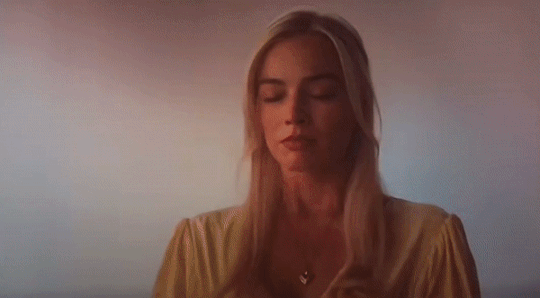
+The second part of this problem is in the conclusion of Barbie's arc. There's a lot of focus in the script about how ideas are forever, but reality isn't: that people will eventually grow old and die and be forgotten. And that's really powerful! But when Ruth asks Barbie to take her hands so she can really understand what she's choosing when she chooses humanity, all the video footage we see Barbie experiencing is happy. There is no anger -- no sorrow -- no loss or pain. And so Barbie saying "yes" to that falls flat, for me. The whole crux of Barbie's arc is embracing the depth of the human experience, rather than Barbie Land's shallow recreation of it...but in the end, there is none of that depth, because Barbie doesn't choose a temporary human existence because she's come to see beauty even in fear, uncertainty, sadness, anger, and pain. She chooses humanity presumably because of the depth of human happiness, in contrast to Barbie Land's, and not even despite all of those more negative things, because again, it's not depicted in that sequence at all. And that felt like a real missed opportunity to me.
Overall, I found this movie incredibly entertaining. Considering I was never a fan of Barbie as a franchise, and yet I was never an active hater either, I honestly had had little interest in seeing this film until I heard such astonishingly positive feedback for it online...and yeah, I am really glad that I did finally get around to seeing it! It's definitely a very relevant and clever movie with some awesome humor and powerful themes, and even with the critiques I have about it, I couldn't be happier that it's getting the praise it's so clearly earned. Way to go, Barbie!
Overall Grade: B
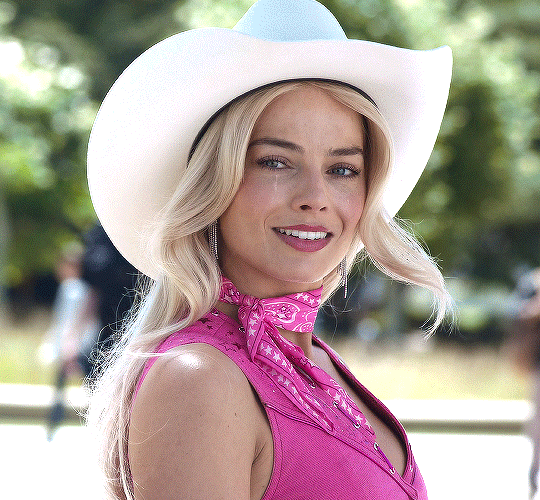
9 notes
·
View notes
Note
you said in a previous ask that if s2 had built on s1 better than the show would have been better. have you ever posted what you think needed to be different in s2? if not would you be willing to?
Oof. So much. This is not like. a full plan of how I would've done s2 differently, but it's just some character things I would've done differently for the siblings. Don't take this too seriously, it's just me spitballing, and this isn't a full re-write, it should have more structure to be that.
But also, overall ground rules.
no amnesia
no romance
no paradox psychosis
no infinite switchboard
no Handler
Viktor does not cause the apocalypse. Diego does.
Let me elaborate by just going through the siblings and where I would've taken them to build on s1.
Luther & Viktor: Putting these two together because that's what I would've done. Keep them together. Luther was holding him going into the portal, I think it would've been really interesting to have these two end up together in the 60s. Viktor should've been unconscious when they arrived (for like. the first episode) because then Luther would have had to make the choice to either protect him or leave him, and the choice to keep him close, the only familiar person around, someone he just betrayed and who just tried to kill him. Someone who ended the world. It would've been interesting to see them work through everything instead of Luther's character development happening off-screen and his apology to Viktor losing meaning because Viktor did not remember anything, they should've worked things out together. Luther gets the time to reflect on his actions and Viktor wakes up to Luther, despite everything, caring for him. This should at some point evolve into a 'Viktor develops his powers'-montage where they use Luther's near-invincibility, he can be tossed around without hurting that much.
Klaus & Ben: Lose the cult, keep the Dave. I haven't thought that one through much, I just hated the cult storyline that went nowhere, but I did really like him trying to save Dave, it was a good storyline. I also think he should've developed his powers more there, because Klaus was sober through his stay in the 60s, so ghosts would have bothered him more, and he should've worked to keep them under control. I keep oscillating between 'this is how Reginald factors into the story, Klaus goes to him for help' and 'no way Klaus and Ben would go to Reginald, Ben becomes an impromptu teacher and that's how their relationship deteriorates'. This one needs workshopping, but I feel like trying to save Dave from dying + becoming more familiar with death as two cornerstones of Klaus' arc would be super fun to explore. Also he doesn't keep Ben away from everyone else, I reckon, but I would have to actually figure out how the season would go to figure out how and why. Something about Klaus getting better at controlling his powers and thus summoning Ben, him having the possibility to interact with the world for the first time in decades and wanting his independence but not being able to get it because he's been dead this entire time, he can never be away from Klaus...it'd be interesting.
Allison: Full disclosure, I really do love Ray, but I said no romances, so. I think it was a missed opportunity to not double down on Allison and sisterhood after s1 and have her form a meaningful relationship with Odessa and the other black women at the salon she worked at. Have her throw herself into community organising and resistance and build other women up after a lifetime of using her powers for selfish reasons. Have it hurt her too, because it makes her think about her daughter and how she will never be able to watch her grow into a strong woman, but at least she can try to build a better world for all of them, but especially for her. And there's the thing with the civil rights plotline either way, I just don't think that TUA as a show does not have the depth or the intelligence to do justice to this real movement, it will always kind of feel like a prop, so I don't think there truly is a way to do it justice, or if there is, someone please tell me. I do think they should've let her be angry at Viktor in s2 already, none of that forgive and forget crap, she was seriously injured, almost lost her life and then was thrust into an environment hostile to her mere existence as a black person, she should've been at least resentful by that point. I would've loved to see a confrontation between her and Viktor, she should've been allowed to express her hurt and it should've taken time for them to be buddy-buddy again. So at some point her storyline should flow into that of Luther and Viktor, but yeah. It'd need some more fleshing out but this is the general idea of where she'd start.
Diego: Alrighty. Instead of playing off Diego's hero complex and obsession with saving JFK as a joke, I think the show should've played it straight. Let him cut off Lee Harvey Oswald's trigger finger. Let him use his ability to deflect bullets to foil and attempts of assassination on the president and save the life of John Fitzgerald Kennedy. But not enough that they don't notice that there has been an attempt on the president's life. The FBI find a way to blame the Russians for this. Boom. Nuclear Armageddon. There's the apocalypse for the season. I wish s2 would have explored Diego's deep-seated need to prove himself, to leave his mark on history as someone who rights wrongs, who saves lives, more seriously, because him being a vigilante, rejecting his father but still trying to be a hero like he raised them to, was so integral to who he was in s1 and I wish they'd explored this in more depth. Also the story beat of trying to do something right that then has massive bad consequences would be on par for this show, I think it would have been really cool to explore. Especially since one of the main plot threads in that season would have been to stop Diego from fulfilling the destiny he set out for himself, make him defy that hero complex, which leads me to
Five: By god, they should have let him orchestrate the JFK assassination like he deserved to. Instead of pointlessly chasing after the apocalypse for a second time in a row and getting world's lamest made-up disease for no reason, they should've made it that he tries to figure out what causes the apocalypse this time around, only to be interrupted by AJ, who wants to recruit him. The thing is that someone keeps foiling the assassination of JFK and no matter how many snipers they sent there to take care of it, nothing helps (as we find out later, the certain someone responsible has bullet-redirecting abilities). And since there is no infinite switchboard in this, someone has to solve this the old way and figure out a foolproof way to kill the president. And so the Commission comes crawling back to Five, who realises that the assassination must happen to avert the apocalypse. So instead of making a deal to kill the Commission board in exchange for going back to 2019, he promises the orchestration of the JFK assassination - we get him trying to plan to foil what he doesn't know is his own brother, but once he does know, that throws another spanner into the works, because he doesn't want to kill Diego. We could have had some really good character exploration similar to the comics where he despises that the Commission has roped him back in, that he keeps having to do things he despises to have a chance at a normal life, and it would've made for some excellent interpersonal drama between him and Diego. I don't even know how this would resolve except for the fact that, you know, JFK bites it. Maybe Five ropes in his other siblings, or his old self. Maybe Reginald's real reason for unadopting them is that he wanted Kennedy alive, and they're the ones who killed him. I just think this would've been a much more interesting exploration of both Diego and Five.
And this is all just spitballing. This is not really a coherent re-write or adjustment. It doesn't take into account that there definitely should be other characters in this. I really did love Elliott, and Lila is a great addition to the cast and should be crow-barred into this somehow. How do all of these storylines converge? How much, if even, should Reginald factor into this? But those are the first ideas that I have to make s2 more coherent with the themes of s1.
190 notes
·
View notes
Note
I know you've already answered something similar, but I sometimes think that I might be on the spectrum. I've become more aware of my stimming/need to stim. But I feel like I'm faking it. That I only think that I see the symptoms because I want to be in with the in crowd (my friends, most of them are) or whatever. And I feel like I would've been diagnosed earlier. Idk I'm just really afraid of bringing this up with my therapist.
It’s okay to be afraid of bringing this up, anon. Bringing anything up with a therapist or psychologist is scary, and this is a big thing to bring up. Especially if you have any reason to feel as though you’ll be ignored or dismissed, and given the ableist ideas many professionals have about autism and how it presents, there is a chance of having to endure the pain of this. It’s a very real, very valid thing to fear, and I think we’ve all felt it at some point.
It’s also okay to feel like you’re faking it. But, honestly, I can’t imagine anyone wanting to be autistic that doesn’t have a connection or similarity of experience that draws us to the label. Being openly autistic means opening yourself up to an awful lot of ableism. It’s hard, scary and sometimes incredibly dangerous. I’ll be honest and say that this word is one of the better things that has ever happened to me, in that it has given me a label, a connection, a community, a way to conceptualise all that is strange in me - and it has opened the door for me to conceptualise other identities (being aro and grey-ace, things I consider connected to autism in me, like my lack of gender). Being able to go back and look at my characters through the lens of I am autistic and accidentally writing characters who are also autistic was a delight I find hard to put into words. But … it is dangerous to be autistic. It means not being understood by so many medical professionals; it means being dismissed. It means having your stims questioned on the street by strangers. For me, it meant having to quit a job because “not being able to control my facial expressions because I’m autistic” wasn’t good enough when a customer got angry at me. It means people having a label to put to your difference and that label used against you.
What I mean is this: on the off chance anyone is actually faking autism to be popular or part of a crowd, they’re opening themselves up to an awful lot of awfulness. That’s an incredibly high price to pay for connection. (I know we autistics are awesome people, but I don’t think many allistics are willing to endure the social consequences of being autistic in return for that awesomeness.) The reality is that most of us are trying to fake allism (consciously or unconsciously) to be popular or part of a crowd, not the reverse.
If you think you might be autistic, please explore it. Please. Follow autistic blogs, track the #actuallyautistic tag here on Tumblr, ask questions of autistic people. The worst that can happen is that you find out you’re not autistic, but you come away having learnt more about us. That harms nobody.
I can tell you, from the very depths of my heart, that time and age has nothing to do with the validity of your diagnosis. Nothing. It has everything to do with the fact that parents, doctors and teachers are awful at recognising autism, especially if you aren’t a cis white boy. Even then, if your autism presents a little atypically, you can still fall through the cracks. It’s only relatively recently that SPD symptoms were even included as part of an autism diagnosis, meaning people with communication skills good enough to muddle through (people like me) were overlooked entirely. It didn’t matter that I had few friendships growing up; it didn’t matter that I lacked a lot in interpersonal skills; it didn’t matter that I had no small talk skills, or any meaningful conversation skills, unless it happened to be a special interest of mine. I could rattle off a script for buying items (after many years of trying to figure this out) and I didn’t stim too much (largely because it had been abused out of me) so I was just shy and quiet, and my parents never mentioned the screaming matches we had about their stealing my pillow (to replace it with a “better” one) to our family doctor.
Anon, I was diagnosed last year. I’m thirty. (I’m a bit older than most people here. I don’t usually give my age out online other than “adult” because, as a writer, so much of my personal details are already readily accessible. But I think, today, this is something you need to know.) True, I’d been told at seventeen by an autistic friend that she and her mother thought me autistic. True, I’d been told at twenty-eight that my psychologist, parent of an autistic son, thought me very similar to him. True, I’d been told at twenty-nine that an autistic friend thought a character I wrote was based on her … when it was actually an exploration of my own SPD symptoms. True, I’d self-dx’d as having SPD for a couple of years. So when I underwent a BPD assessment only to have them tell me that they suspected I was autistic and assessed me for that … well, the evidence was there, but as I’ve said before, I was still shocked. And then I was angry, so angry.
The evidence was there, and two strangers saw it after a couple of one-hour sessions, but so many people who’d known me all my life (the people with the power to improve it) didn’t see it or refused to say the word. How could they have not have seen it? How did they all make me go so long before a professional finally said the word? How was it that I had to spend so many years feeling different, feeling alienated from all the things people don’t struggle with, until finally someone professional told me I’m autistic?
(Of course, now I know more about professionals, I don’t consider their words very important. Reading autistic people’s posts here on Tumblr affirmed my autism. Seeing how similar their challenges and feelings and experiences are to mine affirmed my autism. We are not identical - very autistic is different - but we have enough in common that autism is right for all of us.)
Yet, when I came online, I discovered that this is normal. So normal. That there are women and NB people who are being diagnosed in their thirties, forties, fifties and older. That so many people are only now getting the word that makes sense of their lives. That ableism, racism and misogyny all combine together to routinely deny many people a diagnosis that gives us understanding, identity and community.
As a late-diagnosed autistic, I swear to you that there’s many reasons why you might not have been diagnosed earlier, and none of them invalidate your autism.
My advice is the same as in this post, if you decide you want to bring this up with your therapist. But please know that you can take your time. Do it at a pace that is comfortable for you, if you want to. And if you don’t want to, don’t! If you choose to self-diagnose, the vast majority of the autistic community considers it good enough (as we should) because we know how many of us are missed by professionals. We know the professionals are awful at recognising autism and we’re not going to let their biased viewpoint keep our own from connecting with us and sharing the resources we have.
It’s natural to feel the way you’re feeling, anon, but I don’t believe you’re faking or doing this to be popular. I believe you’re discovering similarities in your own experience, those similarities drawing you to connect with other autistics. ND folk (even unknowing ND folk) tend to folk together - other ND folk make better sense to us, after all!
It’s hard for me to message with people because of my chronic hand pain, so I tend to be quite erratic in this (and if it’s been a high ask day I might not get to them at all that day, so expect that, too) but if you need to talk to me about this, the message box on my personal blog is always open, okay?
Best of luck, anon.
- Mod K.A.
#actuallyautistic#autism focus#autism discussion#discussion post#not a toy#ask#anon#text#personal#long post#very long post#mod K.A.#reassurance post
10 notes
·
View notes